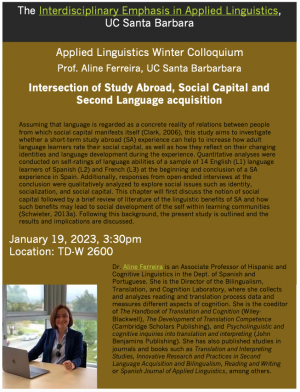Event Date:
- Talk
Prof. Aline Ferreira, UC Santa Barbarbara
Intersection of Study Abroad, Social Capital and Second Language acquisition
Assuming that language is regarded as a concrete reality of relations between people from which social capital manifests itself (Clark, 2006), this study aims to investigate whether a short-term study abroad (SA) experience can help to increase how adult language learners rate their social capital, as well as how they reflect on their changing identities and language development during the experience. Quantitative analyses were conducted on self-ratings of language abilities of a sample of 14 English (L1) language learners of Spanish (L2) and French (L3) at the beginning and conclusion of a SA experience in Spain. Additionally, responses from open-ended interviews at the conclusion were qualitatively analyzed to explore social issues such as identity, socialization, and social capital. This chapter will first discuss the notion of social capital followed by a brief review of literature of the linguistic benefits of SA and how such benefits may lead to social development of the self within learning communities (Schwieter, 2013a). Following this background, the present study is outlined and the results and implications are discussed.

